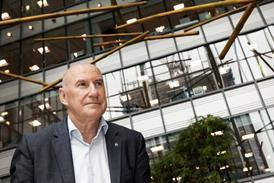The election of Muyiwa Oki as RIBA president was just the first step towards delivering real change, writes Simeon Shtebunaev

My mum and dad admired Margaret Thatcher when they were at university, simultaneously sharing the excitement at the prospect of a free market economy, while protesting the totalitarian communist government they grew up under. The UK’s capitalist structures captured the imagination of young people in the Eastern Bloc, and continue to hold a significant grip on political discourse in many former communist countries.
What my parents only realised years later was that in the transition to a free market economy their education as engineers became worthless. The same economics which they chanted for at protests in the early 1990s led to a botched privatisation and decimation of Bulgarian industry.
Thirty years later they finally have work as engineers, employed by German and Austrian companies. But the price they paid was three decades of lost professional progression.
In the transition towards a post-industrial society, driven by the Thatcher-Reagan ideologies, communities and individuals were left behind. Fairness was not a design feature in the collapse of the Soviet Union, nor in the collapse of working-class communities in the UK, hit hard by the end of coal mining.
We are on the cusp of another such transition, from a service-driven and consumerist society obsessed with growth to one where regenerative design, localised production and green energy will have to become the norm. This time we don’t have a choice - we need to transition to a circular economy or perish.
What then, might the role of the professional institutes be in leading a fair and just transition?
We do have a choice, however, to make this transition fair. The “just transition”, coined by labour and environmental activist Tony Mazzocchi, refers to the foundational shifts in political economy necessary for our societies to repair and advance the social and ecological conditions upon which the future of life on Earth depends.
A “just transition” means moving to a more sustainable economy in a way that’s fair to everyone – including people working in polluting industries, of which arguably the built environment is one. As the most recent IPCC Report suggests, “there is a role for everyone” in the transition, and that must therefore include architectural workers, practices, and institutions.
What then, might the role of the professional institutes be in leading a fair and just transition?
The idea of a just transition has rarely entered architectural discourse yet is gathering momentum in wider society. Last year, we set up a campaign to send a signal to the wider profession that workers’ rights and the climate emergency are interrelated issues.
Electing Muiywa Oki as the RIBA president was a success. However, it was only one step towards embedding the concepts of fairness and equity in the governance of our built environment institutes. There was recognition that such a shift is needed, with past RIBA presidents supporting the campaign publicly.
We believe that people committed to a progressive set of principles at the top can lead to cultural and organisational change
We as professionals should be in the vanguard of this charge towards a new economy and we need new leaders to do this! This is why this year we set up the “Just Transition Lobby”, a cross-institute informal network of professionals who are interested in reforming the way our membership bodies are run.
We believe that people committed to a progressive set of principles at the top can lead to cultural and organisational change. We are targeting the RIBA leadership first, as the oldest and most established out of all the institutes, but we believe all membership bodies need to reform quickly. We have three key principles:
- The institutes must leverage their positions and resources towards radical climate action in and beyond the built environment by ending economic greenwashing, rejecting “business as usual” and acknowledging that we are fossil fuel workers.
- The institutes must endeavour to advance the material and cultural conditions of workers by ending unpaid overtime and overwork, advocate for workers’ rights and work with grassroots organisations.
- The institutes must incorporate Equity, Diversity, Inclusion, and Accessibility (EDIA) as foundational values in all aspects of their work by rejecting empty gestures, recognising EDIA is political and spatial and that accessibility is a choice.
The Lobby will repeat the same strategy we developed in selecting Muiywa Oki - by supporting progressive members of the profession to contest elections (or even just imagine that they can one day occupy such a post) and spending time on understanding the rules and regulations of the institutions.
All you need to do to join us is commit to our principles and imagine that an alternative future is possible
We already saw four members of the Just Transition Lobby elected unopposed in the 2023 RIBA Council Elections - Richard Timmins, South East; Philippa Birch-Wood, West Midlands; Paul MacMahon and Nenpin Dimka, Associate seats. We also have five others contesting seats in the forthcoming election - Thomas Parsons, Greta Jonsson and Oluwafunmbi Adeagbo in London; Calum Duncan in Scotland South and Daniel Brown for the Worldwide Seat.
By establishing the Just Transition Lobby on the governance boards of professional institutes, we want to reform the leadership of our professions. We need quick and radical change. All you need to do to join us is commit to our principles and imagine that an alternative future is possible.
It will not be easy. There has already been a backlash within the RIBA leadership to the election of Muyiwa Oki. There are whispers of introducing a membership charge for students and discussions to revoke the hard-won electoral rights for that membership class in an attempt to reduce the likelihood of further election upsets.
This would be a knee jerk reaction, betraying a lack of long-term strategic thinking or concern about the future. We see this reluctance to reform in the persistence of the same old similar faces at the top of our professional institutes.
This is money which would have been better invested in upskilling RIBA members and helping architects create the new green enterprises of the future
Spending priorities are also misguided. A “House of Architecture” is planned, but this fun palace for one risks becoming a glorified student project, dictating the internal priorities of the institute and devouring staff time and institutional funds. This is money which would have been better invested in upskilling RIBA members and helping architects create the new green enterprises of the future.
After all, the RIBA has a history of developing multi-million businesses such as the NBS, the sale of which is fuelling the current spending extravaganza. It all sends the wrong signals, and whereas the leadership is resistant to move on, the staff are leaving in droves.
There is still hope. At a recent event we heard the RIBA CEO spell out the words “just transition” and our points one by one. They are listening to us, but now they need to start acting for all of us, or get out of the way.
The African-American writer and civil rights activist, Audre Lorde wrote: “For the master’s tools will never dismantle the master’s house. They may allow us to temporarily beat him at his own game, but they will never enable us to bring about genuine change.”
We won the campaign to elect Muyiwa Oki as the RIBA president, because RIBA politics are indeed more akin to student politics and we had the benefit of being students far more recently than the ones we ran against. And as much fun as it is, we do not have time to waste on petty ego-driven projects and personal battles when we need to halve our emissions by 2080.
The RIBA and other professional institutes were created as tools of nineteenth century masters for the service of Empire
We simply call the years since 1989 “преходът” (the transition) in Bulgaria. A catch-all term for a fraught and painful process, characterised by political instability and economic malaise, where powerful characters created their own fiefdoms. Sounds familiar?
We should not repeat the mistakes of the past. We have a unique opportunity to be the leaders in a wider societal change. The just transition is a wider political movement, one which is gaining traction from across the political spectrum.
If we are truly interested in protecting the future of our professions, we must engage and lead. The RIBA and other professional institutes were created as tools of nineteenth century masters for the service of Empire. In turn they are shaping the individuals they come in contact with to fit the mould of those long-gone masters.
Yet in their roots they are a manifestation of collective action. Only collective action can allow us to reclaim and reform those membership structures to suit the needs of our shared futures.
Postscript
The Just Transition Lobby is a continuation of the 2022 campaign to elect a worker as the next RIBA president.
To receive regular announcements from the Just Transition Lobby you can join the campaign whatsapp group here.
Simeon Shtebunaev is a past RIBA co-vice-president for Students and Associates and RTPI Young Planner of the Year 2022.
















No comments yet